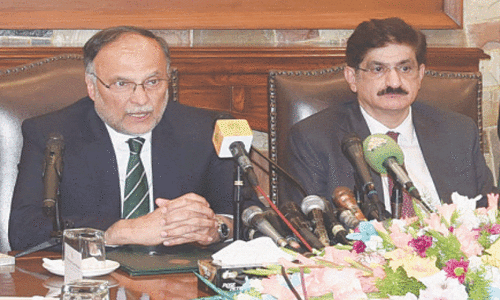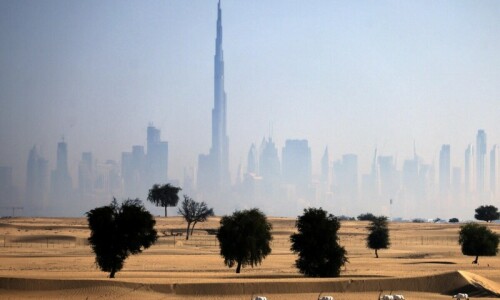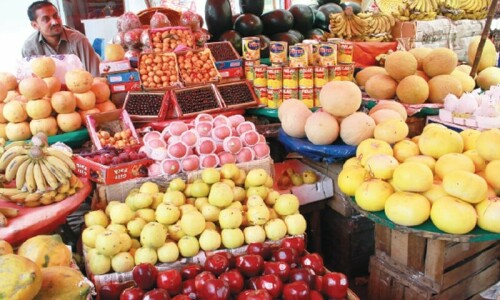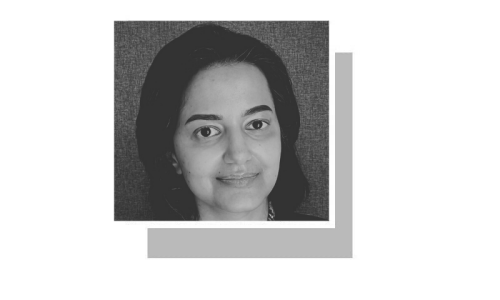KARACHI, Feb 12: A comparative reading of the electoral lists shows that the electorate strength for the upcoming Feb 18 polls has increased by over 1.9 million in Karachi since 2002. Given the close contest expected in some of the city’s constituencies between candidates of the mainstream opposition parties and the parties that were formerly part of the ruling coalition, the increased number of voters initially resulted in quite a few raised eyebrows. Though later dispelled by the Pakistan Election Commission, these doubts are a manifestation of public mistrust over the performance of government institutions.
In just under a week, candidates of various political parties will contest for the city’s 20 National Assembly seats and 168 seats for the provincial assembly, of which 130 seats will be filled by direct election, 29 are reserved for women and nine for non-Muslims. The reserved seats will be allotted on the basis of lists submitted to the Election Commission by the main contesting parties.
On the principle of proportionate representation, any party that succeeds in sending at least 5 (4.48) candidates to the Sindh Assembly, or manages to raise its strength if independent returned candidate(s) join that party within three days of the publication of the official gazette of returned candidates, could get a seat reserved for women. For claiming a seat reserved for non-Muslims, the party must have a minimum strength of 15 (14.44) MPAs in the house.
Amongst the voters, there is growing speculation over the possibility of the elections being rigged, and the increase in the number of voters in Karachi is seen by some as part of a process aimed at pre-determining the poll outcome. The public is sceptical about the performance of government institutions. This wedge between the people and the authorities is not the outcome of the electoral lists of the last elections, but a mindset that has developed as the result of sundry secret agencies’ role in making and destroying governments over the past 60 years.
Perhaps an even greater tragedy for this nation is the fact that not only foreign governments but even observers and watchdog institutions are not prepared to take the repeated assurances of the current regime seriously. Despite all the pledges made by President Gen (retd) Pervez Musharraf that the Feb 18 elections will be free, fair and transparent, there is substantial international concern over the issue. Given the country’s dismal track record as far as fair elections go, neither foreign governments nor the international media are prepared to buy the president’s assurances.
This very state of affairs was the main reason behind the initial mistrust over the new lists notified by the Election Commission for the 2008 elections.
A comparative study of the electoral list shows that the highest number of voters increased in NA-253 (Metroville, Shantinagar, Karachi & NED universities, Gultistan-e-Jauhar, Gulshan-i-Iqbal) where 173,835 were added to the 249,365 registered voters of 2002.
In second place is NA-258 (Bin Qasim town, parts Gadap town, Mangophir) where 154,920 additional voters swelled the lists from 263,393 in 2002 to 418,313 this year.
Other constituencies that have seen an increase of over a hundred thousand (one lakh) voters include NA-250, NA-251, NA-256 and NA-257.
In the constituencies of the Sindh Assembly, PS-126 (Karachi-XXXVIII: Charge 44 of old Karachi East; Gujro town committee) registered the highest increase where the 108,098 voters of 2002 increased by 117,603 to become 225,701 in 2008. Other constituencies that have witnessed an increase in voters by over 70,000 include PS-110, PS-112, PS-114 and PS-129.Asked the reason behind this increase, the secretary of the Pakistan Election Commission, Kanwar Mohammed Dilshad, told Dawn over the phone that this increase could not be termed abnormal if one kept in mind the interest generated by the mainstream political parties since the last elections in 2002.
According to Mr Dilshad, the fact that the outgoing parliament and provincial assemblies completed their tenures created awareness about the importance of each person’s vote in making and unmaking a government. Furthermore, people who were left out in the electoral rolls prepared for the local government and then updated for the general elections 2002 had ensured their inclusion during the door-to-door campaign launched for the preparation of the new lists on the basis of computerised national identity cards. Since the computerised ID card is required for all sorts of purposes such as getting admission into an educational institution, employment, medical treatment or obtaining passports and driving licenses, during the past five years ID cards were obtained by people who had earlier never felt the need for them, said the PEC secretary.
Mr Dilshad also attributed the increased strength of the electorate to the increase in the city’s population, and his organisation’s compliance with the Supreme Court directive that even those people who had earlier been excluded for the want of a computerised national ID card, be included in the electoral lists updated from those of 2002. He further claimed that the numbers of voters had increased in different constituencies since people who had shifted from one locality to another had had their names registered on the basis of their computerised ID cards while their names had also appeared in their old constituencies on the basis of the old lists.
Increase in voters
Seat Area Number of voters Difference Winner in 2002 elections
2002 2008
NA-239 Tapo Gabopat, New Saeedabad, PAF Base Masroor, 228,031 312,401 84,370 Hakim Qari Gul Rehman (MMA)
Mauripur, Lalazar
NA-240 Baldia Town, Shershah, Site, Pak Colony 222,359 279,723 57,364 Sarkaruddin Advocate (MQM)
NA-241 Orangi, Metroville, Faiz-i-Aam Colony 201,562 268,582 67,020 Mohammed Laeeq Khan (MMA)
NA-242 Orangi Qasba, Mansoor Nagar, Benazir Colony 221,227 296,822 75,595 Mohammed Abdul Rauf Siddiqui (MQM)
NA-243 Mangophir, Shah Nawaz Bhutto Colony, Khawaja Ajmer Nagri 250,670 333,290 82,620 Sultan Ahmed Khan (MQM)
NA-244 Parts of North Nazimabad, Nazimabad and North Karachi 236,600 290,891 54,291 Syed Haider Abbas Rizvi (MQM)
NA-245 Gul Bahar, Firdaus and Khamosh colonies, parts of Liaquatabad 255,754 344,004 88,250 Kunwar Khalid Younus (MQM)
NA-246 Federal B Area, parts of New Karachi 261,736 310,045 48,309 Haji Azizullah (MQM)
NA-247 Parts of Federal B Area, Liaquatabad 243,006 303,455 60,449 Israr-ul-Ibad Khan (MQM)
NA-248 Parts of Lyari, including Naval Colony, Shah Baig Lane and Eidgah 255,479 351,345 95,866 Nabeel Ahmed Gabol (PPPP)
NA-249 Allama Iqbal Colony, Dhobi Ghat, Lea Market, Kharadar 250,626 388,099 137,473 Aamir Liaquat Hussain (MQM)
NA-250 Arambagh, Railway Colony, Tibet Centre, Sherin Jinnah Colony, 205,400 344,657 139,257 Abdul Sattar Afghani (MMA)
DHA, Clifton (later taken by MQM in by-elections)
NA-251 Sindhi Muslim Society, PECHS blocks 4,5,6, Azam Basti 210,491 337,393 126,902 Syed Safwanullah (MQM)
NA-252 Parts of Gulshan-i-Iqbal, Garden East, Fatima Jinnah Colony, 222,482 278,643 56,161 Mohammed Hussain Mehanti (MMA)
Central Jail
NA-253 Metroville, Shantinagar, Karachi & NED universities, 249,365 423,200 173,835 Asadullah Bhutto (MMA)
Gultistan-i-Jauhar, Gulshan-i-Iqbal
NA-254 Parts of Korangi, Qayyumabad, Bhittai Colony 230,917 309,017 78,100 Nawab Mirza Advocate (MQM)
NA-255 Korangi Industrial Area, Landhi, Sharif Colony 246,338 324,334 77,996 Mahmood Ahmed Qureshi (MQM-H)
NA-256 Shah Faisal Town, Faisal Cant., part of Malir Town 261,912 371,383 109,471 Iqbal Mohd Ali Khan (MQM)
NA-257 Parts of Bin Qasim and Malir towns, Quaidabad, Khokhrapar 256,535 385,041 128,506 Mohammed Shamim Siddiqui (MQM)
NA-258 Bin Qasim Town, parts of Gadap Town, Mangophir 263,393 418,313 154,920 Sher Mohammed Baloch (PPPP)
— Source: Dawn Election Cell














































